

The Stolen Generations. Stolen Generations: 19/02/2008, Behind the News. Last week we saw one of the most important days in Australian history.
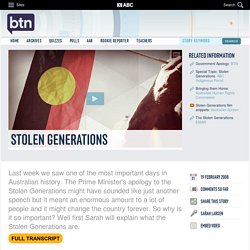
The Prime Minister's apology to the Stolen Generations might have sounded like just another speech but it meant an enormous amount to a lot of people and it might change the country forever. So why is it so important? Well first Sarah will explain what the Stolen Generations are. SARAH LARSEN, REPORTER: Can you imagine being taken away from your home and family, being given a new name, even a new religion and maybe never knowing who you are or where you come from? That's what happened to a lot of kids who belong to what are called the Stolen Generations. In the 1900s the Australian government took thousands of Indigenous children away from their families and put them into missions or orphanages or with white foster families. HELEN MORAN: Mum and Dad had heard that the welfare was going to come and take the children. How could this have happened? In the 1960s people began to campaign for Aborigines to get better rights.
Sorry Day and the Stolen Generations. Warning.
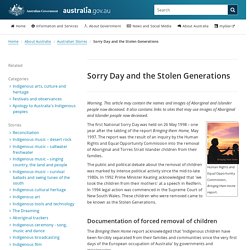
This article may contain the names and images of Aboriginal and Islander people now deceased. It also contains links to sites that may use images of Aboriginal and Islander people now deceased. Human Rights and Equal Opportunity Commission, Bringing them Home report. The first National Sorry Day was held on 26 May 1998 – one year after the tabling of the report Bringing them Home, May 1997. Australian Human Rights Commission. A guide to Australia’s Stolen Generations - Creative Spirits.
Detail of the ‘Great Australian Clock’, Queen Victoria Building, Sydney.
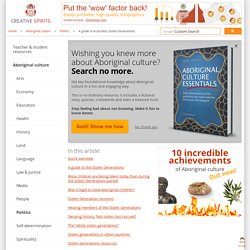
Note that the artist confined Aboriginal men to the painted background, seemingly ignorant of the situation. You can view the clock from the highest level inside the building. Tip: Get free Stolen Generations postcards to send to your friends! Quick overview One of the darkest chapters of Australian history was the forced removal of Aboriginal children from their families. These Aboriginal people are collectively referred to as the ‘Stolen Generations’ because several generations were affected. Many Aboriginal people are still searching for their parents and siblings. Watch this 8-minute video from Australian Screen that summarised the key points of the Stolen Generations: I feel our childhood has been taken away from us and it has left a big hole in our lives.
A guide to the Stolen Generations Define ‘Stolen Generations’ Why were Aboriginal children stolen? Reasons why Aboriginal girls were taken away (in %). Kevin Rudd's 2008 Apology to the Stolen Generations: Immigration Museum. Skip to main content Kevin Rudd's 2008 Apology to the Stolen Generations After decades of political and public debate, the first act of the first sitting of the newly elected Federal Government on 12 February 2008 was the delivery of an official apology to the Indigenous peoples who were taken from families and communities throughout the 19th and 20th centuries in Australia.
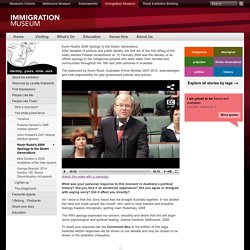
The statement by Kevin Rudd, Australian Prime Minister 2007-2010, acknowledged and took responsibility for past government policies and actions. Watch this video with a transcript. What was your personal response to this moment in Australia’s political history? All I know is that this Sorry fiasco has not brought Australia together. The PM's apology expresses my concern, empathy and desire that this will begin some psychological and spiritual healing.
To share your response use the Comments Box at the bottom of this page. Comments (29) sort by newest oldest J Bridle 21 May, 2013 14:42 reply jono 3 September, 2015 10:00. Stolen Generations stories - Creative Spirits. The stories hat have been shared with us of some of the Kinchela boys have left memories in our hearts that can never be erased.
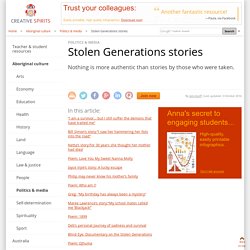
—Marie Bashir, NSW Governor [1] They don't [talk to their old people] anymore; it's all iPhone, iPad, there's no eye-to-eye contact. —Leah Purcell, Aboriginal actor and director [14] “I am a survivor… but I still suffer the demons that have trailed me” “My childhood trauma is on the public record. To the world, I am a highly functioning individual, however, I often relapse and return to the darkest days of my childhood. The cruelties I suffered early in life were not at the hands of another Aboriginal person. My introduction to my Aboriginality was difficult. Just recently the carriage of my trauma cost my marriage. Once again I found myself hiding under the bed, rolled up sobbing; once again the little boy who clung for dear life through fantasies and imagination in a hope for survival. Losing her is the deepest wound, the biggest scar that I now carry. Education - Policies and related issues on ASO.